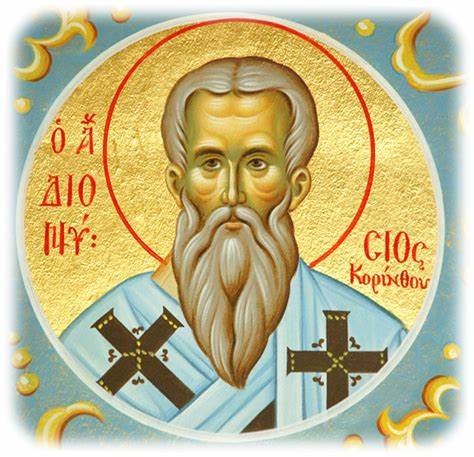
One the most orthodox Catholic writers of the second century, Dionysius was not in Rome, like so many others. He lived out his life in Corinth, a town in southeastern Greece. This holy man worked under the oppression of Marcus Aurelius, who was emperor until 180. Persecutions existed throughout the empire at that time. All that has been preserved about this great bishop is what Eusebius wrote in his “History of the Church”, in the early-mid 300s. None of the original writings has come down to us. But, Dionysius’s own letters were apparently much prized and sent afar. At the time of his writing, Eusebius had access to a collection of the writings of Dionysius, at least seven letters he wrote to congregations, one to a woman and a letter from a bishop. What do these writings tell us?
To Nicomedia, Dionysius wrote the Christians congratulations them for their standing fast in the truth and condemnation of the heresy of Maricion of Sinope that was active in his day.
Writing to the Church at Athens, he reminded them of their late bishop, Publius, who was martyred and of the first bishop, Dionysius the Areopagite.
He wrote to a letter to the Lacedaemonians (the area around Sparta), teaching orthodoxy, and enjoining peace and union.
To the Church of Gortnya and other parts of Crete, he honored the bishop then warned of the distortions of heretics.
To the Church of Amastris, on the Black Sea, he wrote of marriage and celibacy. He urged charity on those who have fallen away.
He had a discussion with Pinytus of Knossus, on Crete, regarding handling those who had difficulty with celibacy. Dionysius had more empathy than the bishop of Knossus, it appears.
In his letter to the Romans, Bishop Dionysius wrote how thankful people were to receive gifts of money from Pope Soter, who reigned around 168-176. He reminded the Romans that both St. Peter and Paul preached in Corinth before going on to Italy, pointing out that they were martyred there for holding on to their Faith. In the same letter, Dionysius spoke of how highly valued a letter from Pope Clement was, so that it was read during Mass.
In the same letter to the Romans, Dionysius said that he had written to them by request and that the letters had been falsified “by the apostles of the devil”. “Small wonder then,” he wrote, “if some have dared to tamper even with the word of the Lord himself, when they have conspired to mutilate my own humble efforts.”
It is a shame that such fascinating letters have been lost to posterity.
The good bishop was dead before 199. His feast day is April 8 in the Catholic Church.

Recent Comments